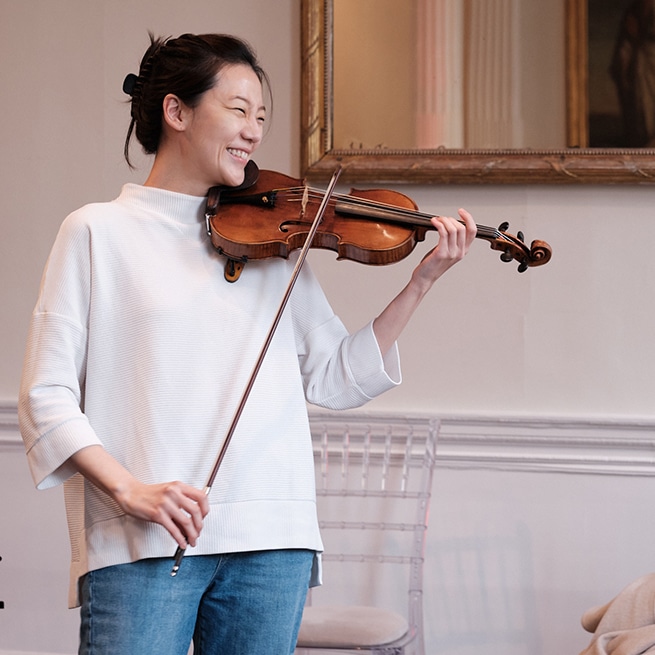Stringing along with my quartet, I am no longer the lead parent
mainOur diarist Anthea Kreston of the Artemis Quartet, on the painful choices a player has to make:

In a heavy touring schedule, but I was able to return home briefly two times in two weeks, one of the benefits of touring in “compact” Europe rather than the vast expanse of North America. I entered a new world of parenting and obligation when Jason and I when I (we) accepted this job. Jason has taken the role as “lead parent”, a term coined by Andrew Moravcsik, Professor of Politics and Director of the European Union Program at Princeton University. He and his wife, Anne-Marie Slaughter, have recently been speaking on the changing expectations of two-career households, and the role of the “lead parent”.
My first stop at home was a 20 hour lay-over which also included a Berlin concert. I was looking forward to catching up with my family, and arrived home, late morning, to an empty home. The first thing I noticed was an unfamiliar smell. Not unpleasant, but singular in any case. I checked the shoe box, the air freshener, and the refrigerator. Nothing presented itself. Jason was gone to his teaching job at the British School, and he texted that he would go directly to pick up the girls. I began to fidget – first cleaning the kitchen, then moving on obsessively to laundry, bathrooms, whatever. Another text told me that they were going to take the bus straight to the Lego store because they needed more “bad guys”. Soon it became clear that I was going to have to leave without seeing them. I arrived home late that night after they were asleep, and left before they woke. I was like a visitor.
The next visit, the following week, also made me feel funny. I didn’t know what they were talking about sometimes – I didn’t recognize the food in the fridge – schedules and expectations were different. Jason said – “let me take the early shift tomorrow – you should sleep in”. I woke around 6, to the padding of feet, and cracked the bedroom door – I wanted to hear what breakfast was like without mom. The most amazing thing followed. An hour of complete silence – the clinking of silverware, the percolating of espresso, some soft murmurs and giggles. The only words were – as the door opened to the hallway – “would you like to stop at the bakery for croissants to eat on the way to school?”. How was this possible? No cajoling, no arguments over which leggings, no repeated reminders to bring gloves. I realized that I had been officially, and extremely capably, replaced as “lead parent”. The reason the house smelled unfamiliar is that it WAS unfamiliar. No more sensory adaptation. I was indeed a visitor.
Feeling confused, I reached out via Messenger to Andrew Moravcsik, with whom I had some contact since he wrote on the Slipped Disc comments section. Here is what I wrote:
“Hello Andrew! I am wondering if you might give me some thoughts. I was going to do a follow-up on “lead parenting”. As we continue this new life, I find myself somehow sad when I return home – I feel disoriented and like a visitor. The rhythm is different, priorities have changed. Do you have a minute to talk about the evolution of lead parenting – how it has evolved for you? Anyway – hope all is well!”
He responded quickly, and sent me a life-line of sorts. His advice and keen awareness of the fragility of balance and expectations has given me a fresh outlook, and saved me from some pretty big mis-steps. Andrew’s wife, Anne-Marie Slaughter, is an incredibly successful woman – an international lawyer, foreign policy analyst, political scientist and public commentator. She is one of the few women who has boldly broken the glass ceiling in many different ways, and her new book is brilliant – “Unfinished Business: Women Men Work Family”.
The comments below are what I received from Andrew within hours of my message – and the words are so true and clear I will include them (with his approval) in entirety.
“Dear Anthea,
As I said, your position is more that of Anne-Marie, whereas I am more the person who assumed the lead parenting, bought new foods and set new habits. But we talk a lot and here is what I learned.
When Anne-Marie was commuting to DC to work for Hillary–and even now when she travels a lot or is in DC for days at a time—she felt, and still sometimes feels, exactly as you do. It was particularly bad in the DC days: our boys were young teenagers and one of them troubled, and so there was a lot of stress and improvisation. This morning when I got your message I asked her and she said, just as in your case: “You and the boys would set up things to suit yourselves: you ate different things, you knew what was up with them so the conversation drifted to things of which I knew little or nothing, and when I came back I was not aware, and you would continue in your routines. If I came back for the weekend (that was our normal routine) by Sunday things might start to normalize, but I would then leave and the cycle would start again. It was extremely frustrating and felt alienated, like I had no home. Our kids also resented me but could not speak about it. When I came back, I would volunteer to drive our older son to baseball practice so we could talk, and he was so resentful he would not say a word.” Some of this you probably don’t experience, because your kids are younger—in many ways our experience is that (contrary to social beliefs), it gets harder as kids get older.
This also creates a subtle (sometimes not so subtle) distance between the parents that has to be overcome, and that’s a lot of emotional work. Plus, I’ll admit sometimes, particularly when our older son was in his period of extreme rebellion, I did not help things by being resentful and wanting simultaneously to remind her I was doing all this work, and also hand it all off to her the moment she entered the door. But—on the flip side, but just as frustrating to Anne-Marie—as the “lead” parent, I also often got to enjoy the emotionally satisfying aspects of parenting: I was there when they achieved things, they confided in me, they called out for me in the night, the fun and crazy moments, or memorable experiences. It’s was frustrating, I know, for Anne-Marie not to be part of all that.
Setting aside the emotional, sharing parenting is also an interesting learning experience from a logistical standpoint: you find that there are many tiny routines you establish, and it is surprisingly costly and annoying to change them. Many are arbitrary, even sub-optimal, but they are just the way someone likes to do things, or is used to doing them. There is, we think—and Anne-Marie writes about this in the book—only one way to deal with this. The person who is the “lead” parent, or who is parenting for a stretch, sets the rules. Some people resist this: they try to set narrow family rules or, worse, try to manage spouses from outside the home. As Anne-Marie discusses in her new book, UNFINISHED BUSINESS, and I recently discussed in detail in an interview on NYC radio (on my website), surprisingly many women—even the most progressive among them—believe in their hearts that men (genetically!) can’t really competently perform house and family work (e.g. preparing meals, getting kids to school on time, calling the plumber), so they need to be “guided” and “managed” in this. How often have I heard, “But this would never work in our house, because when I send Jim to the supermarket, he always gets the wrong type of cheese—even when I give him a list!”, etc., etc.
Working women who say this are both (well-meaning) hypocrites and almost certainly wrong. They are hypocrites because they would be appalled (rightly) and consider it demeaning and unprofessional if men at their workplace said, “Listen, you are very valuable and well-intentioned, but unfortunately you are genetically unable to do this task yourself. But if I give you strict written instructions in every step, I think you might be able to handle it.” In your case, suppose someone said, “Well, as a woman you are well-suited to be a second violin, so just follow what we do and you’ll get through it. We’ll mark up your part, but we don’t need to hear your ideas or suffer any of your spontaneous insights in rehearsal.” You would not be a satisfied professional musician! Yet women often take exactly this attitude, with the genders reversed, about family- and house-work. And of course this drives men crazy. (What women call “guiding,” “managing,” or “helping,” men generally term “nagging” or worse…)
Very early on Anne-Marie and I straightened this out. I insisted that when I am home—and, indeed, since for a while I was really lead parent, even when she is home as well—I’ll set routines as I think proper and she’ll just have to live with it. I recommend you give him slack to do the same. Just react to new innovations with gentle curiosity and have him tell you how to do so. Micro-managing spouses is not only emotionally unsustainable, but rests on a premise that is clearly invalid. Genetically, men can obviously do caring tasks just as well as women can. (For example, I have always done almost all the cooking in our family—minus baking—so in fact this was not really as big a shift for us as for some.) It’s ridiculous to say men cannot decide what type of food to buy and get it done. The problem is just that most have not done so in the past, so it takes some practice. That’s all a question of social norms and expectations, and both individual people and societies can adapt quickly. We know this because men now do lots of things they never used to—I have male friends who now obsessively show me everything their kitchen gas stove can do, how many BTUs it pumps out, etc. exactly the way men in my youth used to obsess about sports cars and their horsepower. We know it also because now we have lots of gay couples with kids and single parents: surely two gay guys or one single male do not raise kids with no order, and gay women or single female Moms do not raise kids without any discipline—or whatever other stereotypes about gender roles one might believe.
So Anne-Marie just had to accept that things would evolve. Sure, we had our foibles: sometimes, being three guys at home, we ordered pizza delivered and played an hour of poker through dinner. Anne-Marie thought this was parental malpractice. But then she, being a Southerner, feels they aren’t really fed in the morning until she has cooked them sickly sweet French toast drowned in syrup, which I (being a Northerner of Hungarian descent) consider unhealthy, unpalatable and unnecessary—but I let her do it because it’s an important (if arbitrary) cultural norm.
I am more hopeful about lead parenting than many things in our society. We have seen great change in social norms over my lifetime: the sexual revolution, women in the workplace; racism (despite Trump) is not something than one can practice, at least overtly; gay people are normalized and have rights. All this makes our everyday life unimaginably different from that of my parents or grandparents. People can and will change—often surprisingly quickly. If men can cook, change diapers, walk around with Snugglies, hug each other, cry, and ignore sexual preference, then surely moving toward more and more male lead Dads is doable.
Does that give you an idea what our experience was with this issue? If any other questions, shoot.
Look forward to your post.
Andy”
As I write this now, at midnight, Jason is in the middle of a week away, playing cello in Barcelona. I have my girls back – for 8 sweet days. Our rhythm is different – I am trying to follow the new patterns which have emerged – and I can’t wait for all four of us to be together again over the holidays. As I raced home from our last concert, my heart was beating like it used to when I was in the first flush of love – I couldn’t wait to get back to see my family. Right now, I can hear the night-time sleeping sounds of our daughters, and I am happy to be finding our new rhythm together.






Comments